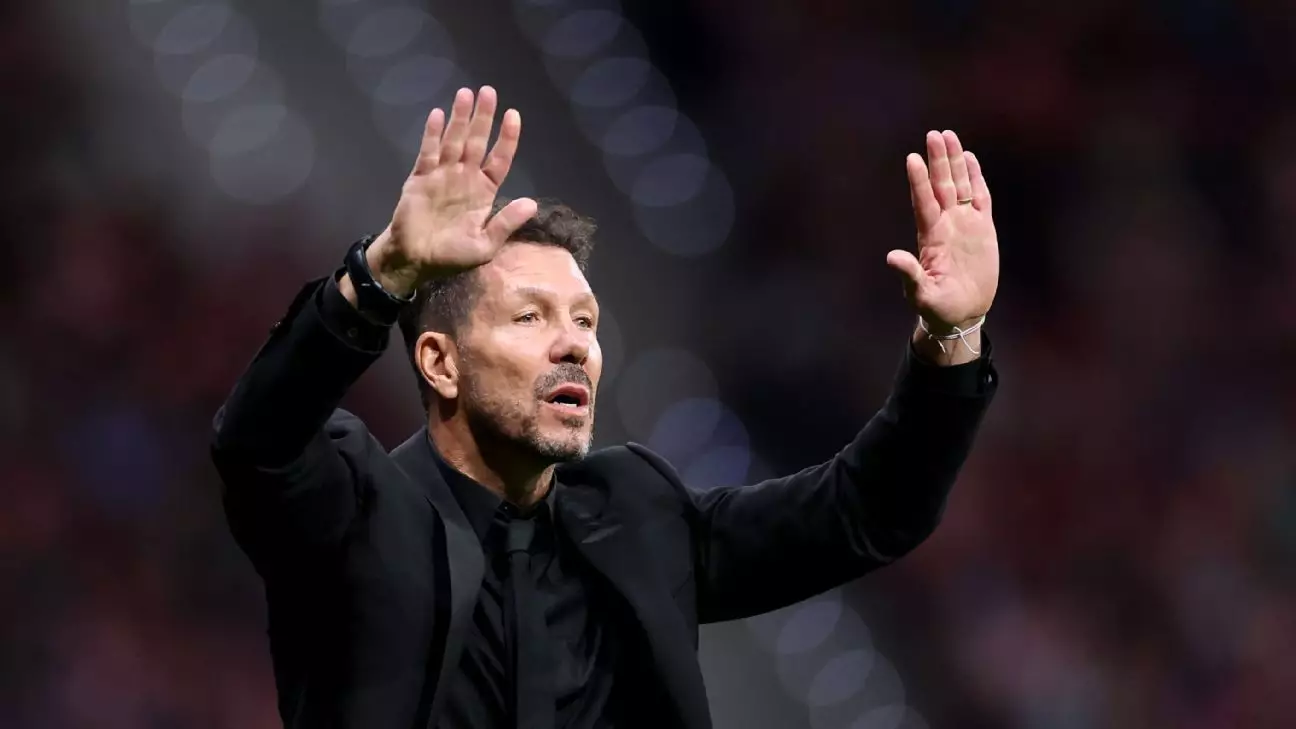The recent Madrid derby between Atlético Madrid and Real Madrid not only showcased thrilling football but also highlighted pressing issues surrounding fan behavior and player conduct. The tension surrounding the match escalated dramatically when objects were thrown onto the pitch, leading to a temporary suspension of the game. This incident ignited a debate about the responsibilities of both fans and players in fostering a respectful and safe environment in the stadium.
Diego Simeone, the head coach of Atlético Madrid, voiced his frustration with the disturbing actions of the fans who threw lighters and plastic bottles onto the field. His criticism extended beyond the spectators to include the players, pointing out that certain celebratory acts can provoke negative reactions from fans. When Éder Militão scored for Real Madrid, poking fun at the home crowd, it sparked a reaction that saw the spirit of competition morph into hostility. Simeone’s insistence that players should be more mindful of their celebrations is a vital reminder in a sport that balances intense emotions with the need for decorum.
Simeone’s commentary reflects an evolving dynamic in football where the emotional involvement of fans is both a boon and a potential hazard. Rather than dismissing the fans’ actions as mere misbehavior, his remarks suggest a deeper understanding of how performances on the pitch can trigger volatile reactions in the stands.
Referee Mateo Busquets Ferrer made a significant decision to pause the game when objects were thrown, a move deemed necessary for player safety and the integrity of the match. Such decisive action underlines the importance of referees not only as enforcers of the rules but also as protectors of the spectacle of the game itself. In a high-stakes environment where tension can run high, the ability to manage disturbing situations effectively is crucial. Carlo Ancelotti, Real Madrid’s head coach, backed the referee’s judgment, emphasizing that prioritizing safety is fundamental in such scenarios, even if it disrupts the flow of the game.
This incident opens the door to discussions about the need for clearer protocols when disturbances occur. While referees must act when fan behavior escalates, there should also be established guidelines that account for the unique atmosphere of rivalry matches while providing a framework for maintaining order.
Simeone’s post-match reflections included a poignant reminder about the image of the club and the fans. The atmosphere at the Metropolitano Stadium, filled with over 70,000 supporters, is often electrifying, yet the actions of a minority can overshadow the collective spirit. The coach highlighted that fans who engage in such behavior do not contribute positively to the team and, in fact, harm the club’s reputation as a whole. The club’s statement following the match expressed a firm stance against the actions of the offending fans, underscoring the commitment to identifying those responsible and ensuring accountability.
This issue reverberates beyond a single matchday; it poses long-term implications for how clubs manage their fan bases. Beyond identifying perpetrators, clubs must foster an environment of respect and sportsmanship, turning passionate support into a constructive force for the team rather than a source of controversy.
The incident also came on the heels of an announcement from La Liga regarding a disturbing social media campaign encouraging racist acts against Vinícius Jr. This highlights a more substantial societal issue within football, where digital platforms can propagate toxic attitudes and behaviors. As rivalries intensify, it’s crucial for the football community, including governing bodies and clubs, to take a proactive stance against online misbehavior that translates into real-world consequences.
The intertwining of social media with football culture necessitates vigilance from all stakeholders involved. Promoting a positive atmosphere and actively condemning unacceptable behaviors is critical to not only preserving the integrity of matches but also advocating for an inclusive environment within the sport.
The issues raised during the recent Madrid derby serve as a clarion call for reflection and reform within the sport. With players, fans, and officials all playing pivotal roles, creating a culture rooted in respect, accountability, and understanding is essential. As football continues to captivate millions around the world, it must rise above the chaos of momentary provocations—striving instead for unity and the shared joy that the sport brings to fans and players alike. The path forward calls for cooperation among all parties, ensuring that incidents like these are not just addressed but fundamentally reformed for the future of football.

